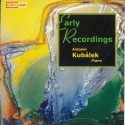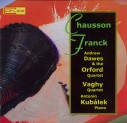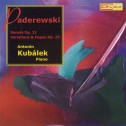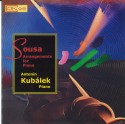EXTENDED PLAY – AK(A) Antonin Kubálek
Antonin Kubálek and his independent recording label AK were introduced in the July issue with Richard Haskell’s review of his Brahms set (AK 01) so I need not add anything further on Mr. Kubálek’s origins, career, performing history and credentials other than to say that he is a multifaceted virtuoso with the highest degree of technique, expression, subtlety and sensitivity. Although these recordings are all remastered from LP’s of the 1970s we are richly compensated by the quality and insight in these performances. Furthermore, his choice of repertoire is adventurous and full of surprises. Serendipity is the best word to describe them.
 To start with, there is the Mozart Rondo in A minor (Early recordings AK 06). This is a fairly late work, almost contemporaneous with the G minor symphony, No. 40. Minor keys are rare in Mozart and this piece is melancholic, played with a wonderfully gentle touch, well differentiated in its parts and in a nowadays sometimes frowned upon romantic manner. Be that as it may this is just right for me. This early disc is particularly rich and rewarding, also featuring works by Beethoven, Janáček and Hindemith. Janáček’s elegiac On an Overgrown Path is a long-time favorite of mine with its influences of nature, folk melodies and Czech language accents. It opens a new avenue in pianism. Each piece is a small masterpiece like “The Madonna of Frydeck” where the ruling minor key changes into major turning infinite pain into gentle sweetness that reminds me of Schubert. “Tears” has a typical Janáček kind of exquisite melody and “The Barn Owl Has Not Flown Away!” is so charming with the flurry of wings grounded by two repeated descending notes. Needless to say this music belongs to Kubálek and very few others can play it as beautifully as he. Hindemith’s Suite “1922” is formidably difficult, dissonant, tongue in cheek, sometimes jazzy, syncopated and inspired, or rather horrified, by early 1920s dance crazes. Hindemith, however, brilliantly intersperses these with dark toned Nachtmusiks perhaps forecasting events to come. “Boston” with its hollow bells and echoes is a particularly strong and despondent uttering.
To start with, there is the Mozart Rondo in A minor (Early recordings AK 06). This is a fairly late work, almost contemporaneous with the G minor symphony, No. 40. Minor keys are rare in Mozart and this piece is melancholic, played with a wonderfully gentle touch, well differentiated in its parts and in a nowadays sometimes frowned upon romantic manner. Be that as it may this is just right for me. This early disc is particularly rich and rewarding, also featuring works by Beethoven, Janáček and Hindemith. Janáček’s elegiac On an Overgrown Path is a long-time favorite of mine with its influences of nature, folk melodies and Czech language accents. It opens a new avenue in pianism. Each piece is a small masterpiece like “The Madonna of Frydeck” where the ruling minor key changes into major turning infinite pain into gentle sweetness that reminds me of Schubert. “Tears” has a typical Janáček kind of exquisite melody and “The Barn Owl Has Not Flown Away!” is so charming with the flurry of wings grounded by two repeated descending notes. Needless to say this music belongs to Kubálek and very few others can play it as beautifully as he. Hindemith’s Suite “1922” is formidably difficult, dissonant, tongue in cheek, sometimes jazzy, syncopated and inspired, or rather horrified, by early 1920s dance crazes. Hindemith, however, brilliantly intersperses these with dark toned Nachtmusiks perhaps forecasting events to come. “Boston” with its hollow bells and echoes is a particularly strong and despondent uttering.
 The original LP of AK 02 was recorded in the 1970s by the CBC in the now defunct Eaton Auditorium with wonderful acoustics, where I heard such legends as Wilhelm Kempff and Annie Fischer (but alas not Rachmaninov, Kreisler and Gould who also performed there!). For the Chausson Concert for violin, piano and strings, Op.21, the Orford Quartet is augmented by Otto Armin so that first violinist Andrew Dawes can join Kubálek in the title role. Here is a performance that truly pushes to the limits; powerful, complex, passionate and rhapsodic. The same can be said for the César Franck Piano Quintet played here with the Vaghy String Quartet. The Quintet caused some uproar upon its debut, and the story goes that Marcel Proust, the notably eccentric French author, hired a group of musicians to play the Quintet for him incessantly day in, day out.
The original LP of AK 02 was recorded in the 1970s by the CBC in the now defunct Eaton Auditorium with wonderful acoustics, where I heard such legends as Wilhelm Kempff and Annie Fischer (but alas not Rachmaninov, Kreisler and Gould who also performed there!). For the Chausson Concert for violin, piano and strings, Op.21, the Orford Quartet is augmented by Otto Armin so that first violinist Andrew Dawes can join Kubálek in the title role. Here is a performance that truly pushes to the limits; powerful, complex, passionate and rhapsodic. The same can be said for the César Franck Piano Quintet played here with the Vaghy String Quartet. The Quintet caused some uproar upon its debut, and the story goes that Marcel Proust, the notably eccentric French author, hired a group of musicians to play the Quintet for him incessantly day in, day out.

 Skipping Paderewski (AK 04), who in spite of being a legendary virtuoso and a great statesman – the prime minister of Poland at one time - never was much of a composer no matter how well Kubálek plays his incredibly difficult pieces, I will proceed to Sousa Arrangements (AK 05). This is a most enjoyable disc where Kubálek shows a completely different side of his talent. I can just see him in a bar playing these marches, waltzes and polkas with flying fingers and great delicacy as an entertainer par excellence. The great Arthur Fiedler would be pleased, for this is not “music of the boring kind”.
Skipping Paderewski (AK 04), who in spite of being a legendary virtuoso and a great statesman – the prime minister of Poland at one time - never was much of a composer no matter how well Kubálek plays his incredibly difficult pieces, I will proceed to Sousa Arrangements (AK 05). This is a most enjoyable disc where Kubálek shows a completely different side of his talent. I can just see him in a bar playing these marches, waltzes and polkas with flying fingers and great delicacy as an entertainer par excellence. The great Arthur Fiedler would be pleased, for this is not “music of the boring kind”.
Editor’s Note: Antonin Kubálek’s recordings are available in Toronto at L’Atelier Grigorian and online at www.grigorian.com and www.cdbaby.com



